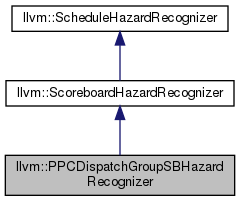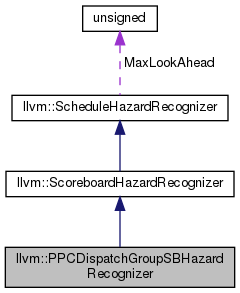PPCDispatchGroupSBHazardRecognizer - This class implements a scoreboard-based hazard recognizer for PPC ooo processors with dispatch-group hazards. More...
#include "Target/PowerPC/PPCHazardRecognizers.h"


Public Member Functions | |
| PPCDispatchGroupSBHazardRecognizer (const InstrItineraryData *ItinData, const ScheduleDAG *DAG_) | |
| HazardType | getHazardType (SUnit *SU, int Stalls) override |
| getHazardType - Return the hazard type of emitting this node. More... | |
| bool | ShouldPreferAnother (SUnit *SU) override |
| ShouldPreferAnother - This callback may be invoked if getHazardType returns NoHazard. More... | |
| unsigned | PreEmitNoops (SUnit *SU) override |
| PreEmitNoops - This callback is invoked prior to emitting an instruction. More... | |
| void | EmitInstruction (SUnit *SU) override |
| EmitInstruction - This callback is invoked when an instruction is emitted, to advance the hazard state. More... | |
| void | AdvanceCycle () override |
| AdvanceCycle - This callback is invoked whenever the next top-down instruction to be scheduled cannot issue in the current cycle, either because of latency or resource conflicts. More... | |
| void | RecedeCycle () override |
| RecedeCycle - This callback is invoked whenever the next bottom-up instruction to be scheduled cannot issue in the current cycle, either because of latency or resource conflicts. More... | |
| void | Reset () override |
| Reset - This callback is invoked when a new block of instructions is about to be schedule. More... | |
| void | EmitNoop () override |
| EmitNoop - This callback is invoked when a noop was added to the instruction stream. More... | |
 Public Member Functions inherited from llvm::ScoreboardHazardRecognizer Public Member Functions inherited from llvm::ScoreboardHazardRecognizer | |
| ScoreboardHazardRecognizer (const InstrItineraryData *II, const ScheduleDAG *DAG, const char *ParentDebugType="") | |
| bool | atIssueLimit () const override |
| atIssueLimit - Return true if no more instructions may be issued in this cycle. More... | |
 Public Member Functions inherited from llvm::ScheduleHazardRecognizer Public Member Functions inherited from llvm::ScheduleHazardRecognizer | |
| ScheduleHazardRecognizer ()=default | |
| virtual | ~ScheduleHazardRecognizer () |
| unsigned | getMaxLookAhead () const |
| bool | isEnabled () const |
| virtual void | EmitInstruction (MachineInstr *) |
| This overload will be used when the hazard recognizer is being used by a non-scheduling pass, which does not use SUnits. More... | |
| virtual unsigned | PreEmitNoops (MachineInstr *) |
| This overload will be used when the hazard recognizer is being used by a non-scheduling pass, which does not use SUnits. More... | |
Additional Inherited Members | |
 Public Types inherited from llvm::ScheduleHazardRecognizer Public Types inherited from llvm::ScheduleHazardRecognizer | |
| enum | HazardType { NoHazard, Hazard, NoopHazard } |
 Protected Attributes inherited from llvm::ScheduleHazardRecognizer Protected Attributes inherited from llvm::ScheduleHazardRecognizer | |
| unsigned | MaxLookAhead = 0 |
| MaxLookAhead - Indicate the number of cycles in the scoreboard state. More... | |
Detailed Description
PPCDispatchGroupSBHazardRecognizer - This class implements a scoreboard-based hazard recognizer for PPC ooo processors with dispatch-group hazards.
Definition at line 26 of file PPCHazardRecognizers.h.
Constructor & Destructor Documentation
◆ PPCDispatchGroupSBHazardRecognizer()
|
inline |
Definition at line 35 of file PPCHazardRecognizers.h.
References AdvanceCycle(), EmitInstruction(), EmitNoop(), getHazardType(), PreEmitNoops(), RecedeCycle(), Reset(), and ShouldPreferAnother().
Member Function Documentation
◆ AdvanceCycle()
|
overridevirtual |
AdvanceCycle - This callback is invoked whenever the next top-down instruction to be scheduled cannot issue in the current cycle, either because of latency or resource conflicts.
This should increment the internal state of the hazard recognizer so that previously "Hazard" instructions will now not be hazards.
Reimplemented from llvm::ScoreboardHazardRecognizer.
Definition at line 207 of file PPCHazardRecognizers.cpp.
References llvm::ScoreboardHazardRecognizer::AdvanceCycle().
Referenced by PPCDispatchGroupSBHazardRecognizer().
◆ EmitInstruction()
|
overridevirtual |
EmitInstruction - This callback is invoked when an instruction is emitted, to advance the hazard state.
Reimplemented from llvm::ScoreboardHazardRecognizer.
Definition at line 176 of file PPCHazardRecognizers.cpp.
References llvm::dbgs(), llvm::ScoreboardHazardRecognizer::EmitInstruction(), llvm::MCInstrDesc::isBranch(), and LLVM_DEBUG.
Referenced by PPCDispatchGroupSBHazardRecognizer().
◆ EmitNoop()
|
overridevirtual |
EmitNoop - This callback is invoked when a noop was added to the instruction stream.
Reimplemented from llvm::ScheduleHazardRecognizer.
Definition at line 221 of file PPCHazardRecognizers.cpp.
References llvm::PPC::DIR_PWR6, llvm::PPC::DIR_PWR7, llvm::PPC::DIR_PWR8, and llvm::PPC::DIR_PWR9.
Referenced by PPCDispatchGroupSBHazardRecognizer().
◆ getHazardType()
|
overridevirtual |
getHazardType - Return the hazard type of emitting this node.
There are three possible results. Either:
- NoHazard: it is legal to issue this instruction on this cycle.
- Hazard: issuing this instruction would stall the machine. If some other instruction is available, issue it first.
- NoopHazard: issuing this instruction would break the program. If some other instruction can be issued, do so, otherwise issue a noop.
Reimplemented from llvm::ScoreboardHazardRecognizer.
Definition at line 141 of file PPCHazardRecognizers.cpp.
References llvm::ScoreboardHazardRecognizer::getHazardType(), and llvm::ScheduleHazardRecognizer::NoopHazard.
Referenced by PPCDispatchGroupSBHazardRecognizer().
◆ PreEmitNoops()
PreEmitNoops - This callback is invoked prior to emitting an instruction.
It should return the number of noops to emit prior to the provided instruction. Note: This is only used during PostRA scheduling. EmitNoop is not called for these noops.
Reimplemented from llvm::ScheduleHazardRecognizer.
Definition at line 157 of file PPCHazardRecognizers.cpp.
References llvm::PPC::DIR_PWR6, llvm::PPC::DIR_PWR7, llvm::PPC::DIR_PWR8, llvm::PPC::DIR_PWR9, and llvm::ScheduleHazardRecognizer::PreEmitNoops().
Referenced by PPCDispatchGroupSBHazardRecognizer().
◆ RecedeCycle()
|
overridevirtual |
RecedeCycle - This callback is invoked whenever the next bottom-up instruction to be scheduled cannot issue in the current cycle, either because of latency or resource conflicts.
Reimplemented from llvm::ScoreboardHazardRecognizer.
Definition at line 211 of file PPCHazardRecognizers.cpp.
References llvm_unreachable.
Referenced by PPCDispatchGroupSBHazardRecognizer().
◆ Reset()
|
overridevirtual |
Reset - This callback is invoked when a new block of instructions is about to be schedule.
The hazard state should be set to an initialized state.
Reimplemented from llvm::ScoreboardHazardRecognizer.
Definition at line 215 of file PPCHazardRecognizers.cpp.
References llvm::ScoreboardHazardRecognizer::Reset().
Referenced by PPCDispatchGroupSBHazardRecognizer().
◆ ShouldPreferAnother()
ShouldPreferAnother - This callback may be invoked if getHazardType returns NoHazard.
If, even though there is no hazard, it would be better to schedule another available instruction, this callback should return true.
Reimplemented from llvm::ScheduleHazardRecognizer.
Definition at line 148 of file PPCHazardRecognizers.cpp.
References llvm::ScheduleHazardRecognizer::ShouldPreferAnother().
Referenced by PPCDispatchGroupSBHazardRecognizer().
The documentation for this class was generated from the following files:
- lib/Target/PowerPC/PPCHazardRecognizers.h
- lib/Target/PowerPC/PPCHazardRecognizers.cpp
 1.8.13
1.8.13